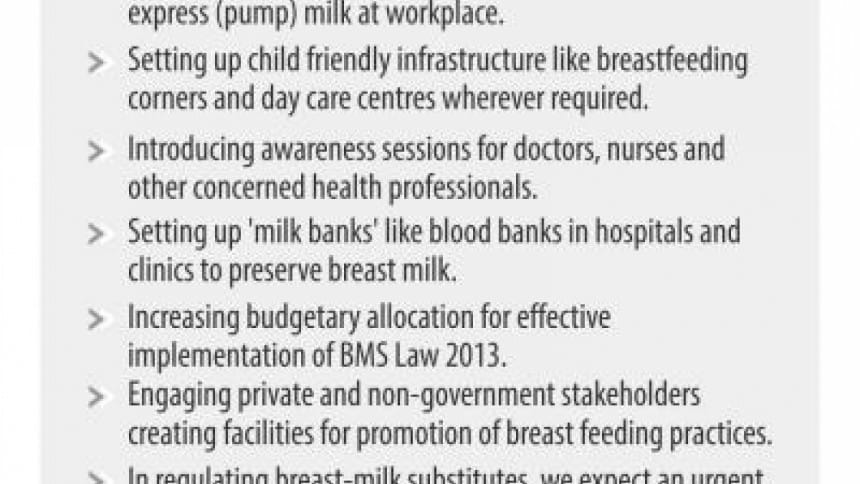There is no substitute

To observe the World Breastfeeding Week, which is marked around the world from August 1-7 since 1992, the World Alliance for Breastfeeding Action (WABA) has declared this year's theme to be "Breastfeeding: a key to sustainable development" August 1-7.
Breastfeeding is in many ways linked with nutrition and food security, health, development, survival, and the achievement of full educational potential and economic productivity. Breastfeeding is an environmentally sustainable method of feeding compared to other substitutes. Linking breastfeeding with sustainable development is relevant and inclusive, as it enables the breastfeeding movement to connect with many other development issues over the next fifteen years to create greater impact globally.
This year, the Ministry of Health and Family Welfare (MoHFW), Institute of Public Health and Nutrition (IPHN) and Bangladesh Breastfeeding Foundation (BBF) have organised a series of events at the national and local level, involving a wide range of stakeholders. This includes but is not limited to influencing policy stakes and creating awareness involving government and non-government agencies, which will be inaugurated on August 02, 2016 by the Honourable Minister of the MoHFW as the chief guest.

Given the legislative history, if we look at the breastfeeding practice, where the 2014 Bangladesh Demographic and Health Statistics (BDHS) shows that 55 percent of infants under age 6 months are exclusively breastfed, which is proportionately lower than the 2011 BDHS reported 64 percent and much lower than the WHO recommended target of 90 percent.
A BRAC study, on the implementation of BMS Law 2013, shows that most important stakeholders such as the doctors, nurses and other health professionals are not aware enough to ensure exclusive breastfeeding. In addition, there is insufficient information about the benefits of breast milk, which has been mountained by social myths, traditional, cultural and superstitious beliefs. The BRAC study also shows that benefits of colostrum feeding were commonly perceived by mothers as the "first vaccination of child" but in practice, mothers often cannot manage to feed colostrum to the newborn baby because of misconception and lack of knowledge. It has been proven that around 95 percent of the caesarean babies are excluded from exclusive breastfeeding as their mothers remain in post-operative care after birth. In addition, many mothers who return to work abandon breastfeeding partially or completely, because they do not have sufficient time, or a place to breastfeed, express (pump) and store their milk. Mothers need a safe, clean and private place in or near their workplace to continue breastfeeding. Enabling conditions at work, such as six months paid maternity leave, part-time work arrangements, on-site crèches, facilities for expressing and storing breast milk, and breastfeeding breaks, can help in this regard.
Breast milk contains all the nutrients needed by children in the first six months of life. Supplementing breast milk before six months is discouraged because it increases the likelihood of contamination, and hence risk of diarrohea. Beyond the immediate benefits for children, breastfeeding contributes to a lifetime of good health. Adolescents and adults who were breastfed as babies are less likely to be overweight or obese. They are less likely to have type-II diabetes and perform better in intelligence tests. Not only children, breastfeeding had also benefited mothers. Exclusive breastfeeding is associated with a natural (though not fail-safe) method of birth control (98 percent protection in the first six months after birth). It reduces risks of breast and ovarian cancer and postpartum depression. Let's echo with and promote breast milk - the first food the first right on earth.
The writer is Programme Coordinator - Advocacy for Social Change, BRAC and can be reached at [email protected].

 For all latest news, follow The Daily Star's Google News channel.
For all latest news, follow The Daily Star's Google News channel. 



Comments